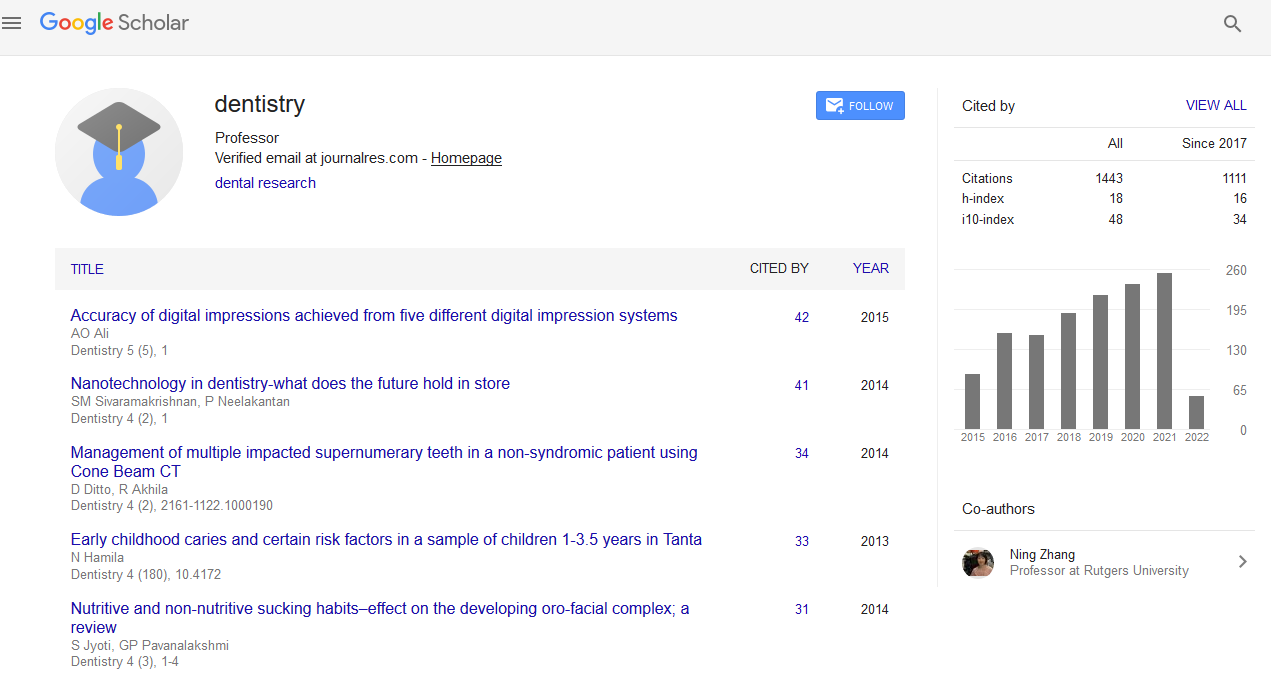Citations : 1817
Dentistry received 1817 citations as per Google Scholar report
Indexed In
- Genamics JournalSeek
- JournalTOCs
- CiteFactor
- Ulrich's Periodicals Directory
- RefSeek
- Hamdard University
- EBSCO A-Z
- Directory of Abstract Indexing for Journals
- OCLC- WorldCat
- Publons
- Geneva Foundation for Medical Education and Research
- Euro Pub
- Google Scholar
Useful Links
Share This Page
Journal Flyer

Open Access Journals
- Agri and Aquaculture
- Biochemistry
- Bioinformatics & Systems Biology
- Business & Management
- Chemistry
- Clinical Sciences
- Engineering
- Food & Nutrition
- General Science
- Genetics & Molecular Biology
- Immunology & Microbiology
- Medical Sciences
- Neuroscience & Psychology
- Nursing & Health Care
- Pharmaceutical Sciences
Tobacco smoking and chewing Oral cancer
15th Euro Congress on Dental & Oral Health
October 24-26, 2016 Rome, Italy
Monika Balkandzhieva and Alper Yilmaz
Dental Medicine of Medical University of Sofia, Sofia Bulgaria
Scientific Tracks Abstracts: Dentistry
Abstract:
It is now accepted that there is an etiological relationship between the smoking of tobacco and oral carcinoma regardless of the type of tobacco and method of consumption. Pipe and cigar smoking have been linked with carcinoma of the lip for many years, and the evidence linking cigarette smoking with intraoral carcinoma is now firmly established. Studies have particularly incriminated heavy cigarette smoker and have shown that those smoking 40 to mote cigarettes per day have a significantly increased risk of oral cancer, ranging from about 10 to 20 times that of non-smokers in different series. The type of tobacco, curing methods, and methods of smoking may also influence the relative risk of oral cancer. For example, the high incidence of oral cancer in India is likely to be due, in part, to widespread smoking of bides and the habit of reverse smoking, a habit that is particularly common in women. Reverse smoking is also practiced in various other countries, for example Colombia, and is associated particularly with cancer of the palate, one of the rarest sites for oral cancer in other groups. It has been reported that the relative risk of oral cancer for reverse smokers is over 40 times that of non-smokers. Smokeless tobacco: Snuff is a finely ground or powdered tobacco which may be inhaled dry or used moist in snuff-dripping by placing a pinch of snuff between the gum and the cheek or upper lip. Report from South-Eastern USA, where snuff-dripping is prevalent, and from Sweden indicate that the habit is associated with a significantly increased risk for carcinoma of the gingiva and buccal mucosa.Tobacco chewing was relatively common in the United Kingdom in the early part of 20th century, particularly in occupations such as mining where smoking was environmentally dangerous because of the possibility of explosion.
Biography :
Monika Balkandzhieva is currently pursuing of Dentistry in Faculty of Dental Medicine of Sofia of Medical University of Sofia, Bulgaria. Alper Yilmaz is Chairman of the General Meeting of the student council of Medical University of Sofia.
Email: monikaaa@mail.bg


